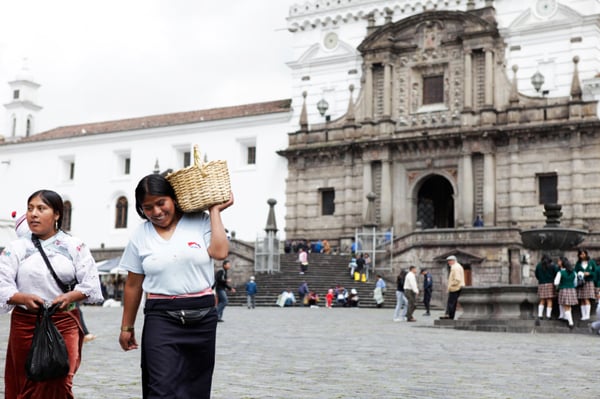
Quito, the capital city of Ecuador, is a bustling metropolis nestled in the Andean foothills. The city is well-served by a variety of public transportation options, making it possible for residents and visitors alike to navigate the city without the need for a personal vehicle. The primary forms of public transportation in Quito are the Metrobus-Q, Trolebus, Ecovía, and the newly constructed Quito Metro. These systems are complemented by a network of local buses and taxis, providing comprehensive coverage of the city and its surrounding areas.
Metrobus-Q
The Metrobus-Q is a rapid transit bus system that operates on dedicated lanes, providing a fast and efficient way to travel across the city. The system is divided into three main corridors, each with numerous stops and frequent service. The Metrobus-Q is generally safe to use, even at night, although it can get crowded during peak hours. The fare is $0.25 per ride, making it an affordable option for daily commuting. However, it’s worth noting that the buses do not have air conditioning, which can make for a hot and uncomfortable ride during the summer months.
Trolebus
The Trolebus, or trolleybus, is another popular form of public transportation in Quito. This electric bus system operates on overhead wires, providing a clean and quiet ride. The Trolebus has its own dedicated lanes, making it a reliable option for avoiding traffic congestion. The system is safe and well-maintained, with security personnel present at major stations. The fare is the same as the Metrobus-Q, at $0.25 per ride. The Trolebus operates on a single line that runs north-south through the city, making it a convenient option for traveling between the historic center and the modern districts of Quito.
Ecovía
The Ecovía is a bus rapid transit system that operates on a dedicated lane along one of Quito’s main thoroughfares. The system is known for its distinctive red buses and the high level of service it provides. The Ecovía is safe and reliable, with frequent service throughout the day. The fare is $0.25 per ride, and the buses are equipped with air conditioning for passenger comfort. The Ecovía line runs from the northern to the southern end of the city, providing easy access to many of Quito’s main attractions.
Quito Metro
The Quito Metro is the newest addition to the city’s public transportation network. This underground subway system provides a fast and efficient way to travel across the city, bypassing the traffic congestion on the streets above. The Metro is safe and clean, with modern facilities and security personnel present at all stations. The fare is $0.45 per ride, slightly higher than the bus systems, but still very affordable. The Metro line runs from the northern suburb of Quitumbe to the southern suburb of El Labrador, with plans for future expansion.
Taxis and Local Buses
In addition to the major public transportation systems, Quito is also served by a network of taxis and local buses. Taxis are a convenient option for short trips or for travel outside of the main transit corridors. They are generally safe and reliable, although it’s recommended to use a reputable taxi company or app-based service. Local buses provide service to areas not covered by the Metrobus-Q, Trolebus, Ecovía, or Metro. These buses are less reliable and can be crowded, but they are an affordable option for getting around the city.
In conclusion, an expat living in Quito could comfortably live without a car, relying on the city’s extensive public transportation network and walking for short distances. While each system has its own strengths and weaknesses, together they provide comprehensive coverage of the city, making it easy to get where you need to go.
Expats talk about Public Transportation in Quito
“You don’t NEED a car but it is nice to have. We bought a Citroën sedan for about $20k. Since we came here about 4 years ago, we were glad to have a car during the pandemic and not be crowded on a bus. Insurance is not required, you assess your risk and decide to get it or not. Yearly registration is about $150 for all taxes and the inspection. We have a diesel so gas is $1.70 per gallon, we fill up about once a month at about $20. Only disadvantage with a car is sometimes finding parking. We live outside of Quito so when I go there I usually drive to the nearest shopping mall, park and take a taxi to wherever I need to go. Most government offices do not have much or any parking. It is nice to have a car so you can go when you want without figuring out all the bus transfers. Bus terminals, stops and buses do have some associated crime, especially going out of town. There are some tourist type areas that are not easily accessible by bus, can get sort of close but then have a long walk if taxis are not available. It will depend on whether you just want to live your life in whatever town you choose (no car) or if you want to regularly get out and explore. When you arrive on bus, you arrive at a terminal or the nearest stop, which may or may not be close to where you want to go and there may or may not be a taxi nearby. Many of the beautiful ecotourism spots are not on bus routes but you could pay for a tour….I have given some pros and cons, it is up to you to decide what is best for your lifestyle,” commented an expat living in Ecuador.


